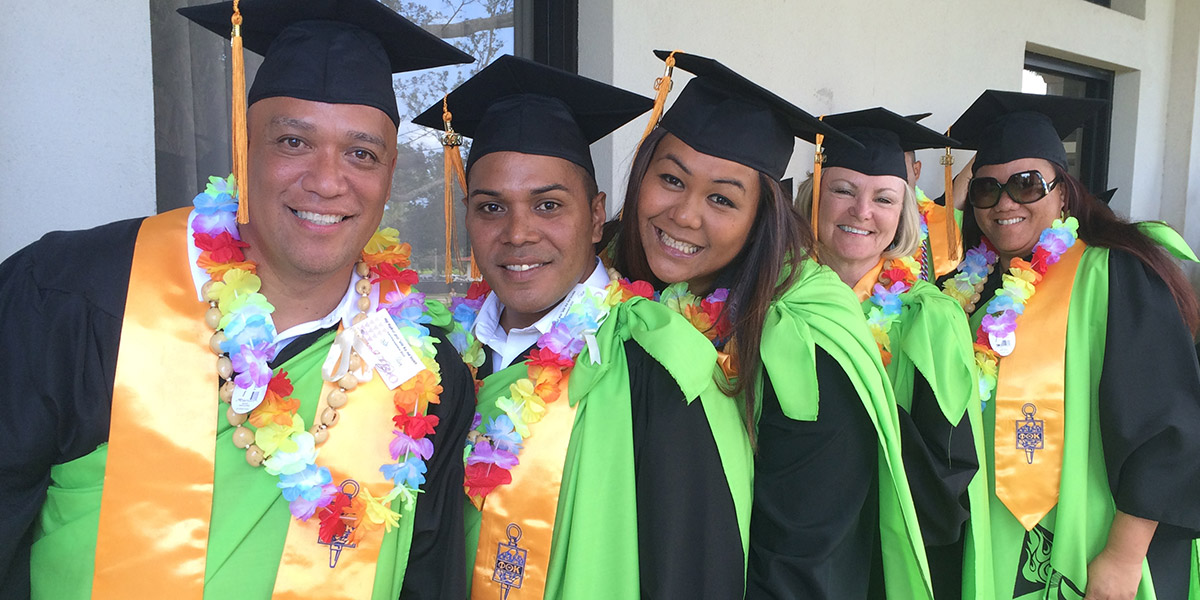L-R: Kevin "Tevi" Tolentino, Derwin "Kekai" Edayan, Kehau Pelekai, Waynella McNeil, Heidi Matthews
Just over four years ago, Kekai Edayan’s obstacles to a college education were daunting and prohibitive. He heard about Windward Community College’s Paipai o Ko‘olau “through the grapevine,” and gave it a shot with 49 other residents of Windward O‘ahu as part of the initiative’s first cohort. The program provided academic, personal, and financial support so these first-generation students who might not otherwise be headed for college might lead a transformation in their community.
“I knew it was time for me to come back to school, but I come from a really big family, and finances were a serious obstacle,” said Edayan. “This is the best thing that ever happened to me. I’m scheduled to graduate from UH Mānoa next semester with my BA in travel industry management.”
Addressing the gap
Nearly 40 percent of Windward O‘ahu’s public school enrollment is of Native Hawaiian ancestry, the highest percentage on the island, and only 17 percent of Native Hawaiians on O‘ahu have associate degrees or higher. This college gap underscores challenges faced by the population, and Paipai o Ko‘olau strives to address these difficulties.
Program coordinator Dr. Sarah Akina said, “It’s for people who don’t think college is possible. We help parents come to school, and they often bring their kids to campus with them. It puts college in their children’s lives, so maybe when they grow up and finish high school, college will be an automatic. We’re aiming for the generational impact it could have on all of these families.”
Developing resilience for the journey
Financial assistance opens the doors to higher education, but personal counseling, academic advising, and peer tutoring help students develop commitment and resilience for the journey to their degrees. Akina said, “It’s that drive, and that willingness to ask for help. Students who have been the most successful have placed into the lowest levels of English and math. But they put in the time, they ask for help, they engage, and they thrive. I ask them, ‘Do you want to be here or not? If you do, I can help you be successful.’”
Edayan agrees. “Without the support of my peers and counselors, I would have been overwhelmed, and I never would have completed those first two years,” he said, “but my counselor held me accountable and kept me focused, and I graduated from Windward magna cum laude.”
Within their first three years, about 35 percent of all Windward CC students either graduate with a two-year diploma or transfer to a four-year campus. For Edayan’s cohort, the number is 50 percent.
Dr. Ardis Eschenberg, Vice Chancellor for Academic Affairs, wrote the original proposal for the program. She said, “It has been an overwhelming success. If we don’t consider the non-traditional adult students in our community, we’re missing out on a huge part of our population. Community college can be a great place for them to grow and learn in a safe environment, and for us all to value their knowledge.”
This knowledge, earned through experience the hard way and supplemented in the classroom, can be shared with the rest of the community. “We have so many who graduate or transfer, and still come back to help with the welcome nights,” said Akina. “They love reaching out to the new cohorts. It’s nice to see how connected they are to the program and to Windward in general.”
Private support helps community take the next step
The Harold K. L. Castle Foundation provided funding for the first four years. Thanks to this partnership, higher education and new opportunities are more accessible to a greater portion of the Windward O‘ahu community. Now in its fifth year, Paipai o Ko‘olau continues to reach into its surrounding neighborhoods, down the street and around the corner. “This is what we want for our families,” said Eschenberg. “To be nurtured, to be strengthened, to grow, and to take the next step.”
Questions? / More Information
If you would like to learn how you can support UH students and programs like this, please contact us at 808 376-7800 or send us a message.
